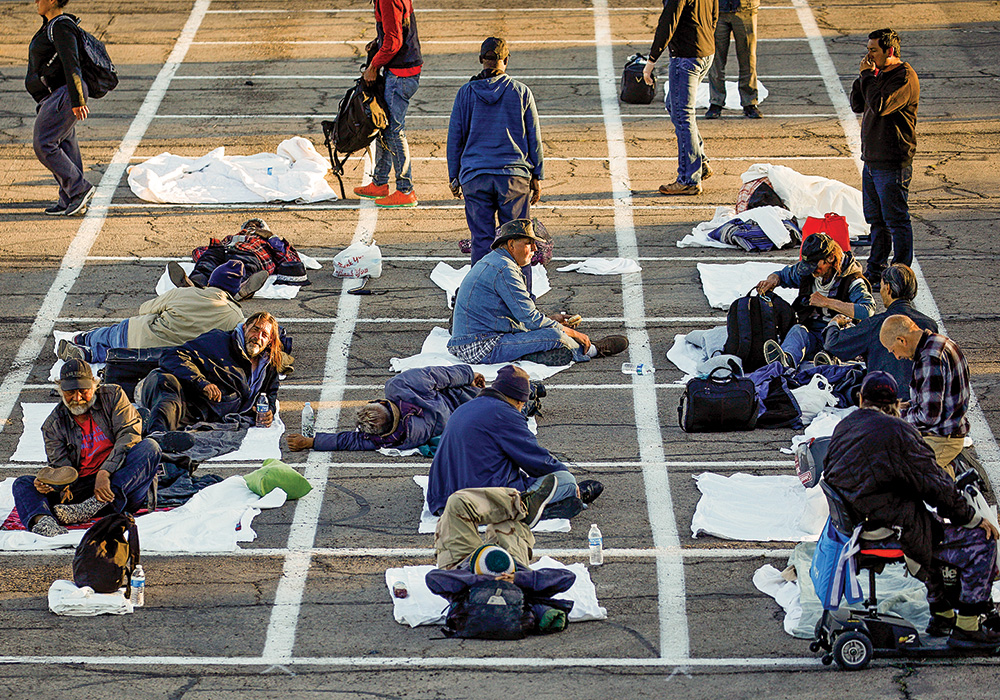Planning May 2020
Housing
When You Can't Shelter at Home
The COVID-19 pandemic has made unhoused populations all the more vulnerable — and left cities scrambling to keep all residents safe.

When a Las Vegas shelter temporarily closed because of a COVID-19 case, its patrons were directed to a nearby parking lot, where they spent the night six feet apart in hastily painted grids. Photo by John Locher/AP.
By Daniel C. Vock
In Las Vegas, dozens of people found themselves suddenly forced to sleep in a parking lot when the homeless shelter they were using was closed for decontamination. In Boulder, Colorado, unhoused residents who likely had COVID-19 found shelter in government-run recovery centers that offered food, showers, and, critically, a place to stay while they recovered without infecting others. And in San Diego, the city set up 66 public handwashing stations to help prevent the spread of the virus.
The outbreak of COVID-19 has strained cities and planning in countless ways, but efforts to protect the health of people experiencing homelessness have been especially challenging. The two most important directives issued — stay at home and wash your hands — are generally impossible for them to follow without aid. Temporary housing, like street encampments or shelters, puts its inhabitants in close contact when they're supposed to be isolated.
While states and cities have closed restaurants, shops, and other public places to slow the disease's spread, shutting down temporary housing would leave many without life-saving resources. Likewise, the U.S. Centers for Disease Control and Prevention has urged cities not to sweep camps of unhoused people during the outbreak.
"Clearing encampments can cause people to disperse throughout the community and break connections with service providers. This increases the potential for infectious disease spread," it warned cities in March.
Some assistance is on the way. Congress allocated $4 billion of March's $2 trillion Coronavirus Aid, Relief, and Economic Security (CARE) Act specifically to supporting unhoused populations. Cities and other local governments may also be able to tap additional funding from the bill, including its increase in Community Development Block Grant funds and financial relief for states and large municipalities. But because local governments still bear the primary responsibility for keeping unhoused residents healthy, they are required to act before receiving any of the promised support.
Getting creative
The public health crisis has led to a number of systemic problems that make homelessness harder to address: the need to isolate and house health care workers, who might also require temporary housing; the shortage of test kits and protective gear that would be needed to properly screen people entering shelters; and decimated city and state budgets to pay for it all.
But the unique nature of the pandemic also means that cities and local governments can consider some unusual solutions, says Jim Brooks, the director of housing and community development for the National League of Cities. Usually, hotel rooms would be filled with visitors, but given travel restrictions, the now empty rooms can be repurposed. The same goes for convention centers, sports stadiums, and even public parks, where cities like Burlington, Vermont, have allowed people to camp out during the crisis.
In the initial weeks of the pandemic, planners spent a lot of time trying new approaches and comparing notes with their colleagues in other cities to find the best approach to addressing homelessness and other issues, says Jason Jordan, policy director for the American Planning Association. In many cases, they were expanding on initiatives they already started, like "housing first" models, in which localities find permanent housing first and then provide medical care and other support.
"This pandemic accelerates that and will make it more of a standard practice," Jordan says. "We are essentially going to test that approach en masse."
Looking ahead
Cities called for making homelessness aid a high priority during the CARE Act's inception because it was one of the areas they were seeing the most immediate needs, Jordan says. The resulting legislation has "plugged some immediate holes that had to be addressed to keep the system moving," he says, "but it's not a long-term solution, and there still needs to be more done."
Congress should make sure that social services are well funded after the initial round of funding runs out and address longer-term concerns like housing affordability and infrastructure, he adds.
A major challenge ahead will be winding down emergency measures once the crisis abates, says Brooks from the National League of Cities. Many state and local governments have placed a moratorium on evictions for tenants who can't keep up with the rent or homeowners who can't make their mortgage payments, but it's unclear right now what happens when those protections end. Can back money be demanded immediately? Will tenants or landlords get a slice of the federal rescue money Congress is sending to cities or states? Or will judges in housing courts work out individual arrangements between landlords and tenants like they did after the Great Recession?
Local governments will take a greater interest in public health going forward, Brook expects. Traditionally, only big cities have dedicated public health departments, while smaller municipalities rely on state or county governments. But those systems have failed in many places, from providing housing options for recovering patients to medical supplies. The situation leaves local governments in a bind similar to the opioid crisis, which prompted them to give Naloxone to first responders.
"Cities are the first touchpoint of these crises, whether they are natural disasters or public health emergencies," Brooks says. "They will approach those tasks much more judiciously and expeditiously, particularly because they know they will be on their own."
Daniel C. Vock is a reporter based in Washington, D.C.


